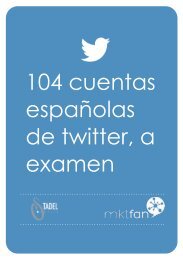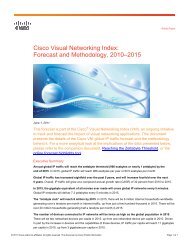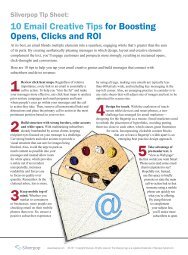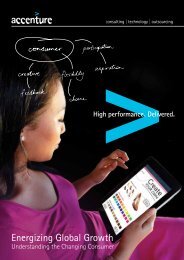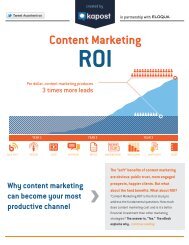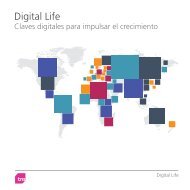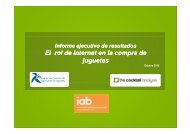Open Innovation 2.0 Yearbook 2013 - European Commission - Europa
Open Innovation 2.0 Yearbook 2013 - European Commission - Europa
Open Innovation 2.0 Yearbook 2013 - European Commission - Europa
Create successful ePaper yourself
Turn your PDF publications into a flip-book with our unique Google optimized e-Paper software.
58 O P E N I N N O V A T I O N 2 0 1 3<br />
Conclusions<br />
<strong>Open</strong> innovation is about extensive networking<br />
between all involved stakeholders (research<br />
organisations, businesses, public entities, user and<br />
user communities), innovation as a co-creative and<br />
user-driven collaborative procedure, and availability<br />
of, and access to, open functional platforms for<br />
interaction between users and service providers.<br />
The role of individuals in the innovation and co-creation<br />
process is increased as they take on different<br />
roles (employee, shareholder, user, citizen, student,<br />
professor, etc.). Citizens’ and residents’ participation<br />
in the governance of the city is the inexpensive<br />
and necessary bottom-up governance which fosters<br />
wealth generation in well-being, in an inclusive society,<br />
in the market, and in the share of profits. Smart<br />
cities are the backbone of Europe’s economy and<br />
have an important role to play in building a smart<br />
economy and digital single market together with<br />
smart people. The further rise of such individuals<br />
results in the creation of a new class: digital entrepreneurs,<br />
who are essential in the current <strong>European</strong><br />
economic situation and for job creation.<br />
The <strong>European</strong> political, cultural and economic<br />
model is based on diversity, subsidiarity, collaboration,<br />
and pervasive creativity across all of society.<br />
All the key assets needed already exist to create<br />
a <strong>European</strong> open innovation ecosystem and for it<br />
to become a source of profitable and fast business<br />
growth.<br />
Finally, I would like to strongly encourage all the<br />
stakeholders involved in the innovation ecosystem<br />
to be brave and see the current crisis and economic<br />
difficulties as an opportunity to grow, to change<br />
and to build a better economy, and to act promptly<br />
towards the solutions, thus creating wealth for<br />
Europe. To end this paper, I want to invoke an entrepreneurial<br />
spirit within every individual with the following<br />
slogan: Think big, start small, accelerate<br />
fast.<br />
References<br />
[1] OECD (2005), <strong>Open</strong> <strong>Innovation</strong> Global Networks<br />
(http://www.oecd.org/).<br />
[2] <strong>European</strong> <strong>Commission</strong> (2010a), Communication from<br />
the <strong>Commission</strong>, EUROPE 2020 — A strategy for smart,<br />
sustainable and inclusive growth, COM(2010) 2020 final<br />
(http://ec.europa.eu/europe2020/index_en.htm).<br />
[3] Chesbrough, H., Spohrer, J. (2006), ‘A research<br />
manifesto for services science’, Communications of the<br />
ACM, Vol. 49, Issue 7, pp. 35–40.<br />
[4] Chesbrough, H. (2003), <strong>Open</strong> <strong>Innovation</strong>: the New<br />
Imperative for Creating and Profiting from Technology,<br />
Harvard Business Press, Boston.<br />
[5] The Bauhaus Archive/Museum of Design in Berlin<br />
(1919–33) (http://www.bauhaus.de/).<br />
[6] OISPG (2009), <strong>Open</strong> <strong>Innovation</strong> Strategy and Policy<br />
Group, <strong>European</strong> <strong>Commission</strong>, former Directorate-<br />
General for the Information Society and Media, Putting<br />
the fine point on open innovation: a common definition<br />
(http://www.openinnovation.eu/).<br />
[7] <strong>European</strong> <strong>Commission</strong> (2010), Communication from<br />
the <strong>Commission</strong> to the <strong>European</strong> Parliament, the Council,<br />
the <strong>European</strong> Economic and Social Committee and the<br />
Committee of the Regions, A Digital Agenda for Europe,<br />
COM(2010) 245 final of 19 May 2010 (http://eur-lex.<br />
europa.eu/LexUriServ/LexUriServ.do?uri=COM:2010:024<br />
5:FIN:EN:PDF).<br />
[8] Kroes, N., Vice-President of the <strong>European</strong><br />
<strong>Commission</strong> responsible for the Digital Agenda: speech:<br />
‘Unlocking the digital future though <strong>Open</strong> <strong>Innovation</strong>’,<br />
during the fourth pan-<strong>European</strong> Intellectual Property<br />
Summit.<br />
[9] <strong>European</strong> <strong>Commission</strong>, Horizon 2020 (http://<br />
ec.europa.eu/research/horizon2020/).<br />
[10] OSI consortium, coordinator G. Sargsyan, Logica<br />
(now part of CGI Group Inc.), ‘Socio-economic impact of<br />
open service innovation — SMART 2009/0077, July 2011<br />
(http://ec.europa.eu/information_society/newsroom/cf/<br />
itemdetail.cfm?item_id=7195).<br />
[11] http://www.eurocities.eu/<br />
[12] http://www.openlivinglabs.eu/<br />
[13] http://ec.europa.eu/information_society/activities/<br />
livinglabs/index_en.htm<br />
[14] http://ec.europa.eu/energy/technology/initiatives/<br />
[15] CitySDK — City Service Development Toolkit<br />
(http://www.citysdk.eu/).<br />
Contact<br />
Dr Gohar Sargsyan MBA<br />
Senior Business Consultant/Member,<br />
CGI Group Inc., Future IT &<br />
Adviser at Amsterdam University<br />
of Applied Sciences<br />
gohar.sargsyan@cgi.com<br />
g.sargsyan@gmail.com



